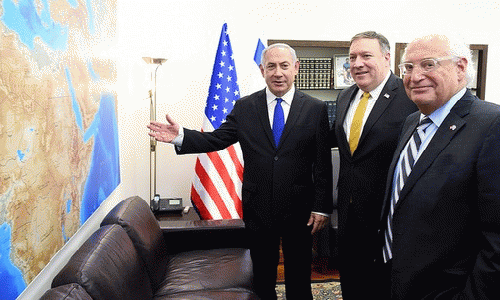From Counterpunch
The Trump administration's "Deal of the Century" for the Palestine-Israel has, predictably, gone over like a lead balloon. So it's shifting gears. The Washington Post reports, "With President Trump's promised Middle East peace plan stalled, administration officials are focusing on improving conditions in the impoverished Gaza Strip -- a move that could put political pressure on Palestinian leaders to come to the negotiating table."
Don't hold your breath.
The "Deal of the Century" was dead on arrival because it was based on the idea that Saudi Arabia and Egypt would "deliver the Palestinians" on the cheap in return for a more formal Saudi-Egyptian-Israeli-US alliance against Iran. The Palestinians were expected to be satisfied with economic-development aid while their aspirations for their own state were essentially tabled, that is, confined to the rubbish bin.
Unsurprisingly, as elements of the deal got around, the demoralized Palestinians were underwhelmed. They already had lost confidence in President Mahmoud Abbas and his Palestinian Authority, which under the Oslo Accords had become Israel's subcontractor for suppressing the occupation resistance. Nor had the Palestinians forgotten how Abbas and his negotiators tried, unsuccessfully, to compromise to an extent that would have destroyed any prospect of a viable independent Palestinian state. This was revealed by the leak of the Palestine Papers, more than 1,600 secret documents, memos, transcripts, and maps from private Palestine-Israel-US talks held over a decade (1999-2010).
The release by Al Jazeera TV and the Guardian in 2011 demonstrated the Palestinian officials' willingness to give Israelis stunning concessions on virtually every major issue while asking little in return, including accepting illegal West Bank and East Jerusalem settlements (with minor land swaps), ceding sovereignty over a vast swath of East Jerusalem, forgoing control of the Muslim holy site Haram al-Sharif to a multiparty committee, and relinquishing the right of return for all but a token few of the millions of refugees created by Israel's officially unacknowledged ethnic cleansing of Palestinians in 1948 and 1967. The Palestinian delegation also said the refugees would not be allowed to vote on the eventual settlement proposal, and it made no objection to Israelis description of their country as the Jewish State, despite the fact that 20 percent of the population is Arab Muslim and Christian.
The Israeli side found the offers politically unacceptable in part because two large Israeli West Bank settlements were not included. Moreover, Israel insisted on its own land swaps: Jewish settlement blocs in the West Bank in exchange for Palestinian villages that straddle the pre-1967 border, or Green Line. This would take Israeli citizenship from Palestinians on the Israeli side of the line without their individual consent and make Israel a purer Jewish state. (Under the status quo, Israel directly controls over 60 percent of the West Bank, so-called Area C.) What's left to the Palestinians is an archipelago of towns separated by Israel-controlled territory. (See Adam Entous's "The Maps of Israeli Settlements that Shocked Barack Obama.")
Since the world to that point had not been told about this Palestinian generosity (many Palestinians preferred the term sell-out) or Israel's rejectionism (Israel is never portrayed as recalcitrant) the revelations came as a shock, especially to the long-suffering victims of Zionism and Palestinian "leadership." The eagerness to compromise also gave the lie, as Jonathan Cook points out, to Israel's chronic complaint that it has "no Palestinian partner for peace." It could hardly have dreamed of a more obsequious partner.
So in light of this record and with the Trump initiative "stalled," a new strategy is shaping up, focused on the humanitarian crisis in Gaza. It's an act of misdirection. Gaza's desperate situation could be addressed as part of an overall resolution, but that's not to be the case.
For one thing, the administration views Gaza with blinders on. Gaza is inhabited by, among others, Palestinians driven from their villages as Israeli military forces cleared the land of Arabs for the newly proclaimed Jewish state in 1948. (Since the removal of Palestinians was started and halfway accomplished before the Jewish state of Israel declared its own existence in May 1948, it's appropriate to say the removal was begun by Jewish or Zionist terrorist gangs. What has been aptly called ethnic cleansing was not just physical; it was cultural and historical as well. Nearly 500 Palestinian villages were eliminated, wiped from the map, and replaced by Jewish towns with new names.)
When the dust settled from the war that followed Israel's declaration of independence in 1948, Egypt held the Gaza Strip (without annexing it) and Jordan held the West Bank (after colluding with the Israelis to prevent an independent Palestinian state from coming into being). The war, which the mostly disorganized, out-numbered, ill-trained, and poorly equipped Arab armies barely fought, enabled Israel to expand its territory from the 56 percent of Palestine recommended by the UN General Assembly to 78 percent. Israel would not declare its borders, preferring to leave that matter for future determination. Then, in its 1967 attack against Egypt, Syria, and Jordan, Israel fulfilled its aspiration to acquire both the West Bank and Gaza Strip. It occupied them militarily and built settlements exclusively for Israeli Jews -- conduct expressly forbidden by international law, as the International Court of Justice affirmed in 2004.
In 2005 Israel dismantled the settlements in the Gaza Strip and relocated the army outside the fence along the two borders. (The southern border is with Egypt, which is an ally of Israel, and the Mediterranean Sea is to the west). Thus Israel still controlled Gaza despite the heralded "withdrawal." In 2005 the Palestinians, fed up with corrupt Palestinian Authority rule, voted Hamas into power in a free election urged by the Bush administration, which was shocked by the results. (For a discussion Hamas, see my "Why Palestine Matters.") After an unsuccessful US-backed PA coup against Hamas, Israel, the US, and the European Union proceeded to punish the Gazans.
In 2007 Israel imposed a full-on blockade, controlling who and what may enter and exit the small territory with nearly two million residents. The point of the blockade is to keep the Palestinians destitute and demoralized. On top of this, Israel has several times waged full-scale air and ground war against the essentially defenseless Gazans, leaving death, injury, homelessness, polluted drinking water, and shocking destruction in its wake. Because the blockade keeps out materials and other goods, needed repairs cannot be made. Gaza is projected to become unlivable in under two years.
Most recently the Israeli military has killed more than a hundred Gazans and injured thousands during mostly nonviolent demonstrations near the border fence. Israel claims that it uses force against the Gazans in self-defense, but this rings hollow considering that Gaza is a big open-air prison completely controlled by Israel. Inhabitants of occupied territories have the right to resist under international law. (What would we make of Nazi complaints that Jews in concentration camps were flying fire kites over German farmland?)
This is the humanitarian crisis that the Trump administration and the major US media refer to. It is not the result of a natural disaster or mysterious illness. It is the result of Israeli policy. Yet you would never know this by most of the discussion by politicians and pundits.
(Note: You can view every article as one long page if you sign up as an Advocate Member, or higher).






